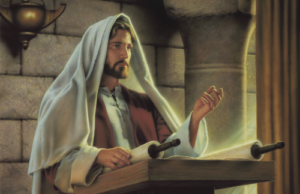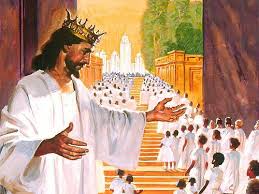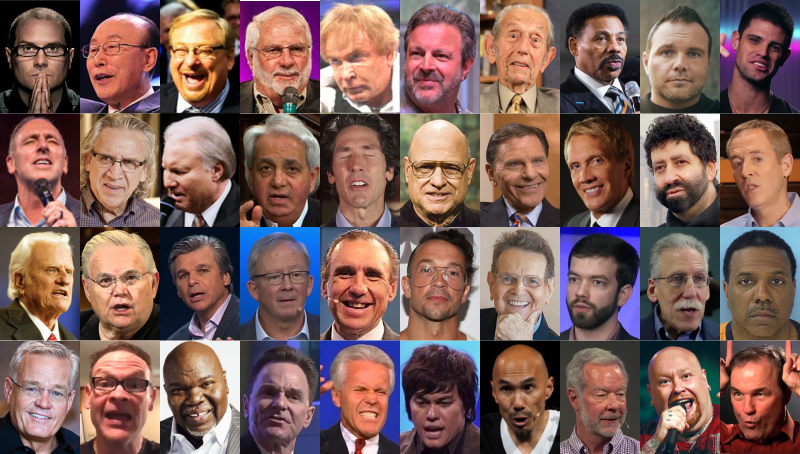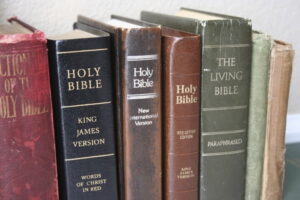- Let’s talk about the word Prophet. How the modern Church defines prophets vs. More importantly, how does God define Prophet.
 The real prophets that we read about in Scripture actually spoke for God. He would tell them to speak an oracle to a certain people group, and it was always God’s words, not the prophet’s.
The real prophets that we read about in Scripture actually spoke for God. He would tell them to speak an oracle to a certain people group, and it was always God’s words, not the prophet’s.
One of the challenges we run into with the word Prophet is that Evangelicals have redefined it to mean something other than how the Bible describes prophets.
Today you may hear that a prophet is one has the gift of being able to recall just the right Scripture verse for a particular situation. Does the Holy Spirit help our minds recall Scripture verses that we’ve learned? Absolutely! This is Wisdom as we grow in maturity in the Word of God. But is that really the “gift of Prophecy?” Not the way the Bible defines prophets.
What does the Bible say about prophets? In the Old Testament there were more than 133 named prophets, and there were prophets in the early church as well. But remember, the early Christians did not have the complete Bible. The last book of the New Testament (Revelation) was not completed until late in the first century. So, the Lord sent prophets to proclaim God’s Word to His people.
 On the other hand, today’s prophets have their own description of Prophet. These prophets make predictions based on the visions they say they download from God. They claim to receive direct instructions for the church, to build and advance the kingdom.
On the other hand, today’s prophets have their own description of Prophet. These prophets make predictions based on the visions they say they download from God. They claim to receive direct instructions for the church, to build and advance the kingdom.
You might think we can build the Kingdom by leading people to Christ. Yes, Christ does grow His kingdom with every saint He regenerates, but His Kingdom is already built, and it is not of this world.
But unlike the prophets in the Bible, today’s prophets:
- Don’t warn you of the coming judgment for unrepentant sinners.
- Don’t point you to repentance and reconciliation with God.
- Don’t ever tell you to test the spirits. In fact the prophetic predictions are so vague that there is really no way to test them.
 Are there true prophets today? If the purpose of a prophet was to reveal truth from God, why would we need prophets if we have the completed revelation from God in the Bible? If prophets were the “foundation” of the early church, are we still building the “foundation” today?
Are there true prophets today? If the purpose of a prophet was to reveal truth from God, why would we need prophets if we have the completed revelation from God in the Bible? If prophets were the “foundation” of the early church, are we still building the “foundation” today?
Today’s prophecies are often unfulfilled or false. But yet they continue to be upheld as prophetic authorities. Many of them contradict each other – there is no unity.
Prophetess Jennifer Leclaire, former editor of Charisma Magazine and inventor of the Sneaky Squid spirit says that when prophecy doesn’t come true, it’s because you didn’t engage in intercessory prayer enough to make it come to be. They will blame it on the people for failing to do something.
Mike Bickle says that the majority – 80 percent – of all of the dreams, visions and manifestations at these services, seminars and conferences are FAKE. But it’s okay, because 20 percent are true, and we need to hold on to the true, he says.
Prophetess Wendy Alec has a very popular book: Journal of the Unknown Prophet, and she claims that she’s received this word directly from Jesus: “For the Word alone is yesterday’s manna, and it is no longer enough to feed my people.” The Bible tells us that yesterday’s manna bred worms and it stunk. How is that for trashing the word of God?
If indeed the self-titled prophets of today are as valid as the ones God anointed in the Old Testament, then Deuteronomy 18:22 and Jeremiah 28:9 both say that the prophets in the Bible had to be 100 percent accurate, or they were put to death. That’s how seriously God takes anyone claiming to speak for Him, claiming “thus sayeth the Lord.”
- Deuteronomy 18:22 When a prophet speaketh in the name of the LORD, if the thing follow not, nor come to pass, that is the thing which the LORD hath not spoken, but the prophet hath spoken it presumptuously: thou shalt not be afraid of him.
- Jeremiah: 28:9 The prophet which prophesieth of peace, when the word of the prophet shall come to pass, then shall the prophet be known, that the LORD hath truly sent him.
- In the book of Hebrews, God makes it quite clear that He no longer requires prophets to speak for Him:
- Hebrews 1:1-3 GOD, who at sundry times and in divers manners spake in time past unto the fathers by the prophets, Hath in these last days spoken unto us by his Son, whom he hath appointed heir of all things, by whom also he made the worlds; Who being the brightness of his glory, and the express image of his person, and upholding all things by the word of his power, when he had by himself purged our sins, sat down on the right hand of the Majesty on high;
Jesus is our Prophet, Priest and King
 Jesus as Prophet
Jesus as Prophet
Prophets were tasked with speaking God’s Word to people. In the Old Testament, this included both proclaiming God’s truth to others and revealing God’s plans for the future. Some of the prophets also performed miracles and healings.
The people of Jesus’ day referred to Him as a prophet many times, and He took the title upon Himself as well (Matthew 21:11; Luke 7:16; John 4:19; Mark 6:4). Both Peter and Stephen spoke of Jesus as being the ultimate fulfillment of Moses’ prophecy in Deuteronomy 18:15—Jesus is the prophet like Moses who must be listened to (Acts 3:17–23; 7:37–38, 51–53).
Jesus taught the Word of God, often speaking in parables. “The people were amazed at his teaching, because he taught them as one who had authority, not as the teachers of the law” (Mark 1:22).
Much like the Old Testament prophets, Jesus also foretold the future. For example, He told His disciples of His pending death and resurrection (Matthew 17:22–23; 20:17–19), Judas’ betrayal (Matthew 26:20–25; John 13:18–30), and Peter’s denial (Matthew 26:31–35; Mark 14:27–30; Luke 22:61; John 13:31–38). He predicted the coming of the Holy Spirit (John 16:7–15; Luke 24:49; Acts 1:4–5), the persecution of His followers (John 16:1–4, 33), and the destruction of the temple (Matthew 24:1–2). Perhaps most encouraging for believers today, Jesus prophesied of His coming return (Matthew 24:30–31; John 14:3).
Like many of the Old Testament prophets, Jesus performed multiple healings and miracles (Matthew 8:1–17; 9:18–33; Mark 1:32–34; 2:1–12; Luke 17:11–19; 18:35–43; John 2:1–11; 6:1–24). He even compared Himself to Elijah and Elisha (Luke 4:24–27). The people of Nazareth rejected Jesus, just as the people of Israel did not believe Elijah and Elisha.
Jesus is the Word of God (John 1:1). He does not simply speak the Word of God as a mere human prophet, but is Himself the Word made flesh (John 1:14). He is the final word, the ultimate revelation of God: “In the past God spoke to our ancestors through the prophets at many times and in various ways, but in these last days he has spoken to us by his Son, whom he appointed heir of all things, and through whom also he made the universe” (Hebrews 1:1–2).
 Jesus as Priest
Jesus as Priest
Old Testament priests served as mediators between humans and God. It was the priests who offered sacrifices on behalf of the people. Jesus is our Mediator and our High Priest: “For there is one God and one mediator between God and mankind, the man Christ Jesus” (1 Timothy 2:5).
Hebrews 4–10 details how Jesus is our ultimate High Priest and how His priesthood is far superior to the Levitical priesthood of the Old Testament. The writer of Hebrews also explains how the Old Testament system of priests served to foreshadow the ministry of Jesus. The Levitical priesthood of Aaron’s line was not intended to continue forever. Jesus’ priesthood is eternal.
Hebrews 4:14–16 says, “Therefore, since we have a great high priest who has ascended into heaven, Jesus the Son of God, let us hold firmly to the faith we profess. For we do not have a high priest who is unable to empathize with our weaknesses, but we have one who has been tempted in every way, just as we are—yet he did not sin. Let us then approach God’s throne of grace with confidence, so that we may receive mercy and find grace to help us in our time of need.” With Jesus as our High Priest, we can go before God boldly, knowing that Jesus has true compassion on us and that, through Him, we will experience the grace and mercy of God (see also Hebrews 10:19–23).
Hebrews 7 shows how Jesus is a priest after the order of Melchizedek. Melchizedek was both a priest and the “king of Salem” who blessed Abraham (Hebrews 7:2; Genesis 14:18). Likewise, Jesus is not just a “priest forever,” but also a king.
 Jesus as King
Jesus as King
The office of king in the Old Testament is illustrated well by David. God called David a man after His own heart (1 Samuel 13:14; Acts 13:22). He promised to David, “Your house and your kingdom will endure forever before me; your throne will be established forever” (2 Samuel 7:16). This promise was fulfilled in the Messiah, who was also given the title “Son of David.” Jesus is this Son of David and the rightful King (Matthew 1:1; Revelation 22:16).
The angel Gabriel told Mary that Jesus “will be great and will be called the Son of the Most High. The Lord God will give him the throne of his father David, and he will reign over Jacob’s descendants forever; his kingdom will never end” (Luke 1:32–33).
The Son of David would be a ruler of God’s people, and also their deliverer. The Jews of Jesus’ time expected a political king (Matthew 21:1–11). Instead, Jesus conquered sin and death (1 Corinthians 15:54–57). He promised He will also return to the earth to rule as a king, first in the Millennial Kingdom and then forever (1 Corinthians 15:24–28).
Jesus has “all authority in heaven and on earth” (Matthew 28:18). He has “the name that is above every name” (Philippians 2:9–11). Jesus is the King of kings and Lord of lords (Revelation 19:16), and one day He will be king in the earthly, political sense of the word, as the weight of governance is borne on His shoulders, He reigns on Mt. Zion, and the nations bring Him homage (Psalm 2:6; 48:1–2; Isaiah 9:6; 11:10). Even before then, He truly is the ultimate authority. Even though His enemies are not yet made His footstool (Psalm 110:1), Jesus should be reigning fully in our hearts.
Normally, the three offices of prophet, priest, and king were distinct from each other, with no overlap. That is, a king was not a priest or a prophet. A priest did not function as a prophet or a king. And a prophet simply did a prophet’s job without trying to be a either king or a priest. But Jesus Christ perfectly fills all three roles simultaneously: He is the Prophet, Priest, and King, to the great blessing of the world.
Reference: bereanresearch/Eljasib




